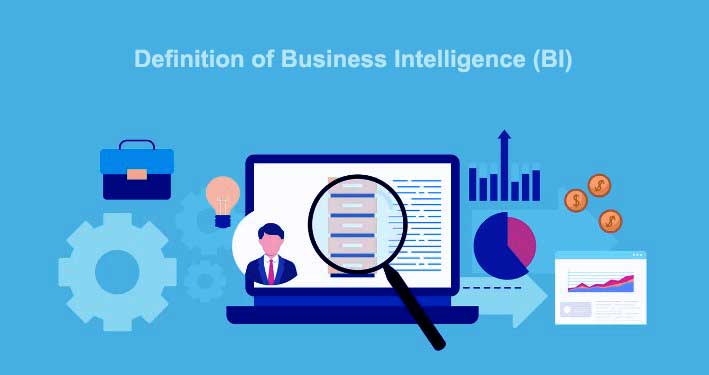Definition of Business Intelligence (BI)

Business Intelligence (BI) refers to a set of technologies, processes, and tools that enable organizations to collect, analyze, and transform raw data into valuable insights.
BI helps businesses make informed decisions by providing accurate and timely information, often presented in the form of reports, dashboards and data visualizations. It covers a wide range of activities, including data warehousing, data mining, reporting, and data analysis, all aimed at improving the overall efficiency and competitiveness of an organization.
Benefits of Business Intelligence
Informed Decision Making: BI empowers organizations with actionable insights derived from data analysis. Decision makers can rely on these insights to make informed and data-driven choices that align with strategic objectives.
Improved Operational Efficiency: BI tools can simplify and automate the data collection and reporting process. These efficiencies result in time and cost savings by reducing manual effort and minimizing errors.
Competitive Advantage: BI enables companies to identify market trends, customer preferences, and competitive threats. Armed with this information, businesses can adapt and innovate more effectively, thereby gaining a competitive advantage.
Improved Customer Experience: BI enables companies to better understand their customers’ behavior, preferences and needs. This knowledge can lead to personalized marketing strategies and improved customer service.
Forecasting and Planning: BI tools can help forecast sales, demand, and financial performance. This helps organizations plan resources, budgets and inventory more accurately.
Risk Management: BI can identify potential risks and vulnerabilities in business operations, thereby enabling proactive risk management strategies to mitigate adverse impacts.
Examples of Business Intelligence Applications
Sales and Revenue Analysis: BI tools can analyze sales data to identify the best performing products, regions, or salespeople. This information can guide sales strategies and pricing decisions.
Financial Reporting: BI systems can automate financial reporting, helping organizations track expenses, revenue, and profitability. This is important for budgeting and financial planning.
Customer Analytics: BI allows businesses to segment their customer base, understand purchasing patterns, and create targeted marketing campaigns. For example, e-commerce companies can use BI to recommend products based on customers’ browsing and purchasing history.
Supply Chain Optimization: BI helps organizations optimize their supply chains by analyzing data related to inventory levels, supplier performance, and demand forecasts. This ensures efficient operations and cost savings.
Human Capital Analytics: HR departments can use BI to analyze employee data, such as employee turnover rates, training effectiveness, and workforce demographics, to improve talent management and retention strategies.
Operational Dashboards: Businesses can create real-time dashboards that display key performance indicators (KPIs) for various departments, allowing stakeholders to monitor and respond to changing conditions immediately.
Predictive Analytics: BI tools can leverage historical data to make predictions about future trends, such as customer churn, equipment maintenance needs, or market demand, thereby helping organizations proactively address potential problems.
In short, Business Intelligence is a valuable asset for organizations looking to harness the power of data to gain insights, make informed decisions, and maintain a competitive advantage in today’s data-driven business landscape.
Applications range from sales analysis to supply chain optimization, all aimed at improving operational efficiency and driving growth.